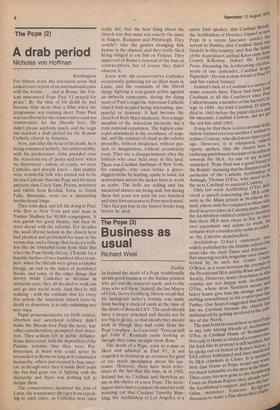The Pope (2)
A drab period
Nicholas von Hoffman
Washington For fifteen years the television news had ended every report of an international crisis with the words,'.. .and in Rome, the Vatican announced Pope Paul VI prayed for peace'. By the time of his death he had become little more than a filler when the programme was running short. Pope Paul was too liberal for the conservatives and too conservative for the liberals here. He didn't please anybody much, and his reign has marked a drab, period for the Roman Catholic church in America.
Now, just after the hour of his death, he is being compared politely, but unfavourably, with his predecessor. John presided over the American era of 'peace and love' when we discovered —unless, of course, we were Catholics and already knew — that papists were wonderful folk who turned out to be far less Catholic than the Pope and far more patriotic than Uncle Sam. Priests, ministers and rabbis from Keokul, Iowa, to Great Falls, Montana, went on a nauseating brotherhood binge.
Then John died, and left the doing to Paul,
who flew to New York and said mass in Yankee Stadium for 90,000 congregants. It was garish but good theatre, but then he went ahead with the reforms. For decades the small liberal faction in the church here had pleaded and petitioned for mass in the vernacular, and a liturgy that looked a trifle less like the triumphal scene from Aida. But when the Pope finally did say, I'll settle fora humble fanfare of two hundred silver trumpets, when the liberals were given a simpler liturgy, an end to the index of prohibited books, and some of the other things that always made Catholics so déclassé in unitarian eyes, they all decided to walk out and go into social work. And they're still walking — with the estimate that for every five priests the American church loses by death or desertion, it is only ordaining two new ones.
Papal pronouncements on birth control, abortion and sacerdotal celibacy didn't make the liberals love Paul the more, but other considerations prompted their desertion. They seldom left in public defiance. Some discovered, with the imposition of the Pauline reforms that they were Presbyterians at heart who could never be reconciled to Rome as long as it remained a monarchy, others just seemed to lose interest, as though once they'd made their point the fun had gone out of fighting with the hierarchy and there was nothing left to detain them.
The conservatives mourned the loss of Latin, the reassurance they got from repeating to each other, as Catholics here once really did, that the best thing about the church was that mass was exactly the same in Saigon, Budapest and Pittsburgh. They couldn't take the guitars twanging folk hymns in the chancel, and they really liked being obliged to eat fish on Fridays. They approved of Rome's renewal of the ban on contraceptives, but of course they didn't observe it.
Even with the conservative Catholics occasionally gathering for an illicit mass in Latin, and the remnants of the liberal clergy fighting a rear-guard action against an imbecile episcopate, during the dying years of Paul's reign the American Catholic church had stopped being interesting, purposeful or dynamic. It had become the church of Holy Mary mediocre. Not a single member of the American hierarchy has a truly national reputation. The highest episcopal attainment is the avoidance of scandal, and the conduct of ritual as the rubrics prescribe, without eloquence, without passion or imagination, without eccentricity even. They are a disappointment after the bishops who once held sway in this land. There was Cardinal Spellman of New York, for example, who once broke a gravediggers strike by leading, spade in hand, his seminarians across the picket lines to work as scabs. The bells are tolling and the memorial masses are being said, but during these last years few paid the two hundred and sixty first successor to Peter much mind. They had put him in the history books long before he died.






























 Previous page
Previous page